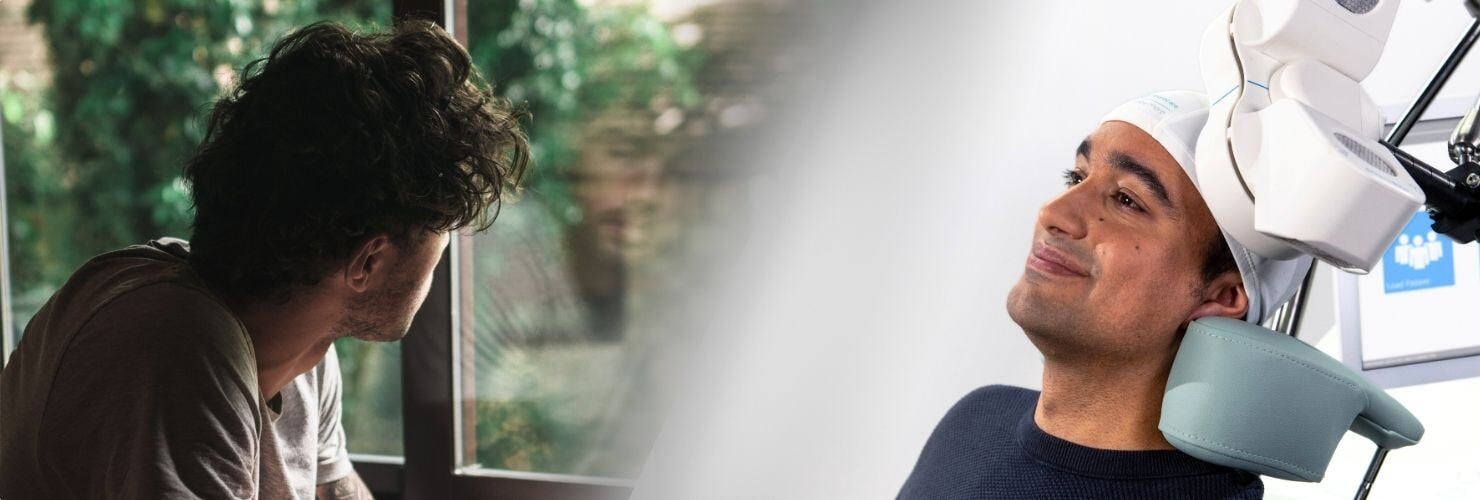TMS treatment for SAD
Seasonal Affective Disorder (or SAD for short) is a form of depression that can take away the good things in life during certain times of the year. TMS treatment for SAD could help.

Straight to:
Transcranial Magnetic Stimulation (TMS) is an innovative approach seasonal affective disorder treatment.
It’s a non-invasive therapy for seasonal depression that uses magnetic pulses to calm the areas of your brain that control our mood and motivation.

About Seasonal Affective Disorder
Causes
As with many mental health conditions, the cause of SAD isn’t clear. Mental health charity, MIND, suggest there are four potential causes, which include:
- The impact of light
When light enters your eye, messages shoot to the part of your brain that control mood, motivation, appetite and sleep. If there isn’t enough light (because of the shorter daylight hours), the functions slow down. - A disruption with your body clock
Our natural body clocks set themselves using daylight and the dark of nighttime. As a result of the clocks going back, your sleep patterns might change, and your body clock could slow. This results in exhaustion and, ultimately, depression. - Levels of melatonin
In the dark, the brain produces melatonin, which is a hormone that helps your body prepare for sleep. SAD sufferers may produce higher levels of the hormone, thus making them sleepier – almost like when an animal hibernates! - The weather
We all have preference when it comes to the weather and temperature; some of us like the heat and sunshine of the summer, whereas others prefer the crisp, chilly mornings of Autumn. If you feel particularly uncomfortable in extreme weather, you could be more susceptible to developing depression.
Symptoms
Symptoms of SAD tend to be similar to those of clinical depression and can include:
- Lacking motivation
- Feeling tired and lacking energy
- Losing confidence and self esteem
- Being unable to find happiness in things that you usually enjoy
- Experiencing problems sleeping
- Losing your appetite or overeating
- Lacking concentration
- Losing your sex drive
- Having suicidal thoughts
SAD treatment options
Traditional methods of treatment for seasonal depression include medication, talking therapy and light therapies. Unfortunately, these don’t always work. If you’re looking for a different approach, then TMS seasonal affective disorder treatment could help.
Research has shown that Transcranial Magnetic Stimulation (TMS) for seasonal depression, and as a treatment can reduce the symptoms of seasonal affective disorder. With no anaesthetic, no need for hospitalisation and no recovery time, it’s a safe and effective alternative to traditional SAD treatment options, with fewer side-effects than medication.
TMS therapy for SAD can help you enjoy life all year round.
How does TMS treatment work for SAD?
The treatment works by stimulating the prefrontal cortex – the area of the brain that controls mood, motivation and social skills. Instead of numbing emotions, as medication can do, TMS treatment gets to the root of the problem by resetting brain patterns and pathways using targeted magnetic pulses.
A course of TMS for SAD usually involves 30 sessions of treatment which take place over a period of three to six weeks. Each treatment lasts 30 minutes, and some patients are able to have more than one session a day.
TMS treatment costs
Assessment price
After completing your online questionnaires and confirming that TMS is right for you, you'll have a video chat with one of our expert clinicians. This session is an opportunity for you to discuss your condition in detail, ask any questions you may have, and receive personalised advice on how TMS treatment can benefit you.
The cost of this assessment is £350.
Depression and anxiety treatment prices
At Smart TMS, we recognise that a large percentage of our patients suffer from depression and anxiety alongside one another. For this reason, we treat these two conditions together within the same session.
TMS treatment for depression and anxiety is split into two courses. After 15 sessions, the results of the treatment are very apparent for most patients.
| London | Other locations | |
| Initial course (15 sessions) |
£3,750 | £3,300 |
| Second course (15 sessions) |
£3,750 | £3,300 |
| Total costs (including assessment) |
£7,850 | £6,950 |
"Everyone I dealt with was extremely friendly, helpful and supportive. Having suffered from treatment resistant depression, I feel I can now face so much of the major stressors in my life. This has been such a successful treatment for me and if you compare it to a recurring prescription of therapy, it works out so much more affordable without any side effects."
"Friendly knowledgeable staff and excellent service. The clinic in Bristol was clean and easy enough to find from the train station. I wasn't sure what to expect of the treatment but once I was used to it, it became quite relaxing and I am feeling much better than before I started. I'm looking forward to going back each month to have my top up sessions."
"The practitioner who carries out my treatment was very professional and made the whole experience stress free."
Continuous care

Dr Neal and his team understand the need to help our patients stay well beyond the end of their TMS treatment. Using research and our own experience, we have designed aftercare packages to provide ongoing care with a planned programme of regular top-up treatments.
Have you had TMS treatment for depression at another clinic? Smart TMS can offer you maintenance therapy, too.










